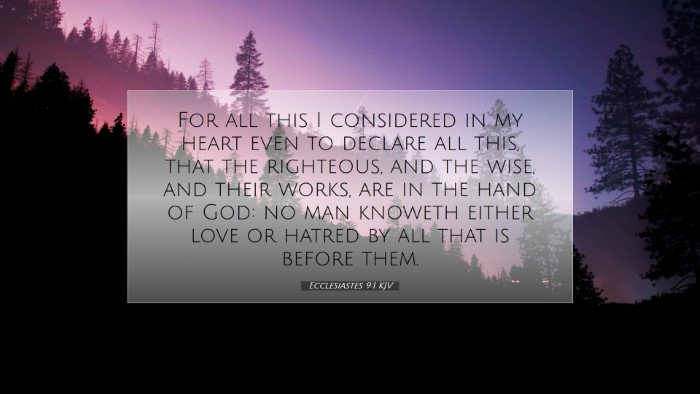Commentary on Ecclesiastes 9:1
Ecclesiastes 9:1 (KJV): "For all this I considered in my heart even to declare all this, that the righteous, and the wise, and their works, are in the hand of God: no man knoweth either love or hatred by all that is before them."
Introduction
The book of Ecclesiastes is often regarded as one of the most philosophical writings within the Scripture. In Ecclesiastes 9:1, the Preacher reflects on the nature of life, righteousness, and the inscrutable ways of God. This passage leads to profound insights regarding divine sovereignty and the human condition. Public domain commentaries by Matthew Henry, Albert Barnes, and Adam Clarke provide valuable perspectives on this verse.
Summary of Insights
-
Human Incomprehensibility:
According to Matthew Henry, the verse emphasizes the limits of human understanding. He notes that while the righteous and wise are secure in God's hand, the outcomes of their actions are often uncertain. No man can know the full extent of either love or hatred in life—emotions that govern human relationships often elude our understanding.
-
Divine Sovereignty:
Albert Barnes underlines the theme of God's sovereignty. He asserts that while humans exert effort in their decisions, ultimately, all is governed by God's authority. The reference to righteous and wise individuals underscores that their lives and actions are under divine governance, shedding light on their fate and the subsequent experience of either joy or suffering.
-
The Nature of Life:
In Adam Clarke's view, life is portrayed as unpredictable. He elaborates that the verse suggests a lack of reliable information about life and death, good and evil. Clarke emphasizes the inherent mystery of God's plan; even those who follow God faithfully may find themselves facing inexplicable trials.
Detailed Analysis
The Context of Ecclesiastes
Ecclesiastes belongs to the genre of wisdom literature. Its author, traditionally identified as Solomon, grapples with the fleeting nature of life and the apparent randomness of fortune. In 9:1, a transition occurs from pondering the futility of worldly endeavors to recognizing a deeper, spiritual understanding of life governed by Divine providence.
Righteousness and Wisdom in Divine Hands
The verse begins by affirming that the righteous and wise, as well as their works, are in the hand of God. This phrase signifies not only possession but also protection and purpose. Henry suggests that being in God’s hands implies that their lives are secure, but it also suggests a challenge; the wise must tread carefully, knowing that their fate is ultimately not under their control.
Love and Hatred: The Limits of Perception
Both Barnes and Clarke highlight the paradox that one cannot definitively discern love or hatred through observable events. Human experience is rife with contradictions—good people suffer while the wicked prosper. Barnes puts forth the idea that while we may see the external conditions of life, the internal state of one's heart remains a mystery. It opens up a discussion about the need for faith amidst such uncertainty.
Theological Implications
This verse invites deep theological reflection. It raises questions about God’s nature, human agency, and the meaning of justice. The acknowledgment that all—both righteous and unrighteous—are in God’s hand confronts the reader with the reality of divine providence against the backdrop of human suffering:
- Divine Justice: How can we reconcile the existence of suffering with the belief in a just and loving God?
- Faithfulness Vs. Outcome: Should our understanding of God’s goodness be contingent on our circumstances?
- The Role of Mystery: Is it acceptable to live with questions that may never find answers in this life?
Practical Applications
For pastors and theologians, Ecclesiastes 9:1 serves as a poignant reminder of the nature of faith in practice:
-
Encouragement in Trials:
The recognition of being in God’s hands can provide comfort to those undergoing hardships. It assures believers of God’s sovereignty and protection.
-
Humility in Wisdom:
Understanding the limits of our knowledge calls for humility. It encourages believers to lean into faith rather than rely solely on understanding.
-
Embracing Uncertainty:
Welcoming life's uncertainties can deepen one’s faith. Instead of seeking to control outcomes, believers are encouraged to trust in God’s plan.
Conclusion
Ecclesiastes 9:1 encapsulates the complexity of faith in a broken world. The commentary insights from Henry, Barnes, and Clarke illuminate not only the theological depth but also the practical implications of understanding God’s sovereignty in relation to human experience. Just as the wise and righteous are held in God’s hands, so too must believers navigate a life filled with uncertainties, anchored in the faith that God’s purposes prevail in ways that transcend human comprehension.


